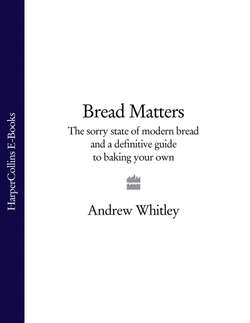Читать книгу Bread Matters: The sorry state of modern bread and a definitive guide to baking your own - Andrew Whitley - Страница 33
Take, eat…
ОглавлениеThere is another reason why it matters what bread we eat. Our choice of bread is symbolic, in the sense that it reflects something more profound than the mere desire to be filled.
I am intrigued by the transformation that is central to leavened bread. The process by which dough changes in response to kneading, expands slowly through yeast fermentation and then is fixed in a new form in the oven has a mysterious quality even to those who know the science. The mystery lies not in the fact that we cannot predict the outcome when we assemble the necessary ingredients, although some variability is always likely in nonindustrial baking. What is, I contend, endlessly mysterious is the fact of the transformation itself. Perhaps when we participate in that transformation, when the result is, reliably, bread, we cannot help feeling a humility born in part of a sense that we are not the only agent in the process.
It is not hard, therefore, to see why bread has acquired symbolic significance. Bread is life, in the sense that without food the body dies. But bread also represents life because it is the result of an indefinitely renewable cycle involving the birth, reproduction and death of the organisms within it (yeasts, bacteria, etc).
Much of the symbolism around bread involves sharing. From the derivation of our word ‘companion’ (someone with whom we share bread) to the words in the Christian Eucharist, the material simplicity of bread as food is constantly suggestive of its involvement in friendship, hope and transformation.
